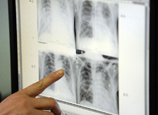
A senior health official in Shanghai on Wednesday denied media reports that the city might have delayed reporting the outbreak of the previously lesser-known H7N9 bird flu to the national health authorities.
"We finally confirmed the deadly virus on March 20 and soon sent the virus sample to the national disease control department," Lu Hongzhou, deputy director of the Shanghai Public Health Clinical Center and a leading public health expert in the city, told China Daily.
The Southern Metropolis Daily reported on Wednesday that the Shanghai health department confirmed the H7N9 virus on March 10 but reported the virus to the national health department 12 days later, triggering public speculation that Shanghai had deliberately delayed reporting the case.
"During the few days prior to March 20, we collected information, medical records and tested samples. It was on March 20 that we determined the virus to be H7N9, a bird flu virus that had never been found to affect humans before," Lu said.
By 5pm on Wednesday, the H7N9 virus had infected 33 people and killed nine of them, according to the National Health and Family Planning Commission. All the infections were detected in the eastern provinces of Jiangsu, Zhejiang and Anhui, and Shanghai.
Lu said public health professionals had no idea of the new virus before it was found, so it was reasonable to spend some time confirming it.
On February 19 three patients were admitted to the Shanghai No 5 People's Hospital.
Tests by the city's heath departments ruled out the possibilities of seasonal flu, H1N1 flu, H5N1 flu and SARS in the three deaths. Lu from Shanghai Public Health Clinical Center then suggested it was possible the patients were infected with a new virus as the H1N1 virus experiences continuous recombination and variation.
Shanghai health authorities finally confirmed the virus as H7N9 on March 20 and sent it to the national health department for further tests, in keeping with protocol, Lu said.
On March 29, the China Center for Disease Control and Prevention found the H7N9 virus in samples sent from Shanghai, and two days later it was announced that H7N9 bird flu was found in humans for the first time.
"Identifying and judging a new virus should be a cautious process, which needs time," said Liu Ye, a lawyer from the Shanghai Haishang Law Firm who has a strong medical and virology background.
TIMELINE
• Feb 19 An 87-year-old man surnamed Li and his two sons are admitted to the Fifth People's Hospital with flu symptoms.
• Feb 26 Sample of Li's virus is sent to local lab after health expert suggests he may be infected by a new virus.
• Mar 4 Li dies. The sample is sent to another lab for a second test.
• Mar 7 Rumor appears on Weibo doubting the unexplained deaths in the hospital.
• Mar 20 Shanghai identified H7N9 virus.
• Mar 22 The sample is sent to the Chinese Center for Disease Control and Prevention to verify.
• Mar 29 The CDC identifies H7N9 virus.
• Mar 31 National Health and Family Planning Commission announces findings to the public.
• April 2 Shanghai holds first H7N9 news conference and activates emergency plan.



















![]()
